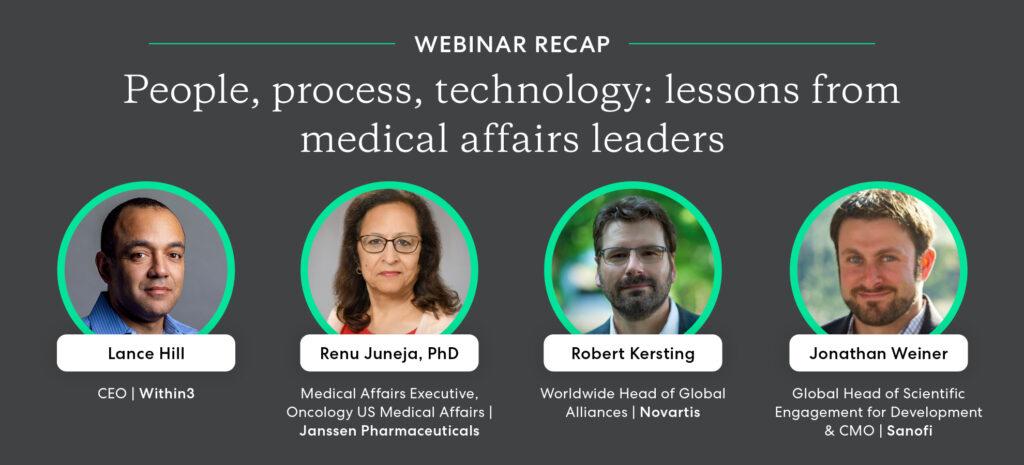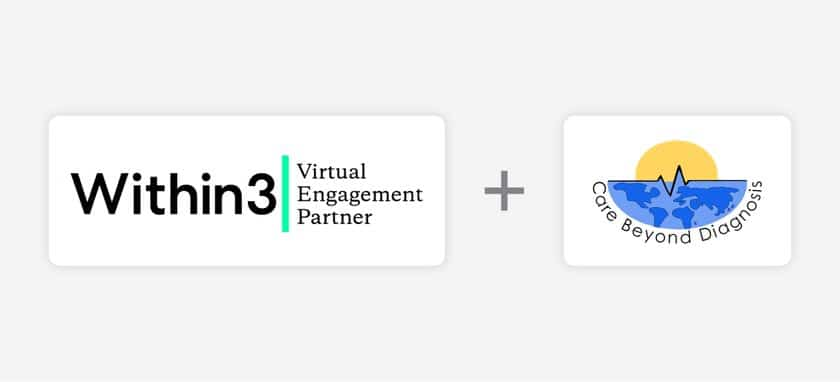Insights management is acknowledged across the life science industry as pivotal for informing and influencing strategy. Despite this, companies approach insights gathering in a fragmented and inefficient manner, with a lack of consistent frameworks. The risk is a loss of strategic advantage due to information being synthesized too slowly, and decisions being made on old or incomplete data. Should teams be focusing on people, processes, or technology when considering how to improve their insight gathering? The key to developing a robust insights management strategy is striking the right balance between all three, according to a medical affairs expert panel.
What are medical affairs experts saying about insights management?
Recently, Within3 CEO Lance Hill joined a group of industry leaders for a MAPS member-exclusive discussion about uncovering and sharing what medical affairs teams can do now to move towards a more holistic approach to insight-gathering activities, in turn enabling them to make better, faster decisions. Along with Hill, the panel included:
- Renu Juneja, PhD, Medical Affairs Executive, Oncology US Medical Affairs, The Janssen Pharmaceutical Companies of J&J
- Robert Kersting, Worldwide Head of Global Alliances, Novartis
- Jonathan Weiner, Global Head of Scientific Engagement for Development & CMO, Sanofi
“Gathering insights and making them actionable is a fundamental pillar of organizations,” said Hill. “What you do and how you manage insights can be difficult, depending on the size of the organization.” Ultimately, what’s the goal for insights management, and what’s the role of people, process, and technology for getting there? As the discussion unfolded, experts offered their thoughts around a few key themes.
The sweet spot of people, process, and technology identifies actionable insights
If the question was whether to focus on people, process, or technology, the answer was to prioritize each. “[Medical affairs] can’t focus on one…[we] have to focus on all,” said Weiner. “If any are lacking, value will be limited. Upskill people to understand [this], ask for insights, then communicate internally across the organization, including to R&D.”
Junega agreed, and called out the necessity of creating a system of constant feedback in which people who provide insight understand the effect their input can have. “All three domains have a role to play. How do we get the sweet balance between them to make them powerful, actionable, and then close the loop? The information must be integrated from MSLs, education, virtual advisory boards, one-on-one, and social listening. Bring [them] all together for power, then see what rises to the top. Act, but don’t forget to share…what they brought in and what we acted upon.”
The challenges and opportunities of omnichannel engagement
Technology made engagement more convenient and immediate for medical affairs but also multiplied the streams of incoming information – all of which need to be organized, analyzed, and acted upon. The cost of missing an important insight is high, and medical affairs teams must mine disparate sources, identify what’s critical, and validate what they’ve learned before adding insights to a scientific narrative. “It’s a struggle, but a massive opportunity to provide value to internal colleagues,” said Weiner.
Ask the right questions to create actionable insights
Medical affairs teams should begin by understanding what questions they need to have answered to move their work forward. “We need to ask ‘is this relevant or important to the medical community,’ and continue to ask the right questions,” said Kersting. If the typical approach is not meeting the team’s needs, “…then revise questions or create additional data, education, or publications. Those should create action items that result from insight gathering.”
MAPS members can watch the webinar in its entirety. Or, read more about modern insights management from the perspective of Within3 CEO Lance Hill (no membership required). You can also catch up with the Twitter chat.






